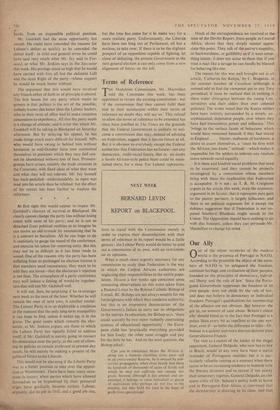Terms of Reference
NEXT WEEK BERNARD LEVIN REPORT on BLACKPOOL
tives to travel with the Commission merely in order to express their dissatisfaction with their terms of reference in its report would be a futile gesture : the Labour Party would do better to send out a commission of its own, with no restrictions on its opinions.
What is much more urgently necessary for any commission to study than Federation is the way in which the Central African authorities are neglecting their responsibilities to the native popu- lation. Dissent a few weeks ago contained some interesting observations on this score taken from a Pastoral Letter by the RoMan Catholic Bishop of Umtali. RC Bishops are not always notable for the forthrightness with which they condemn authority. but this is an impressive, denunciation of the Government's failure to carry out its obligations to the natives. In education, the Bishop says, 'there could scarcely be two more violently contrasting systems of educational opportunity': the Euro- pean child has 'practically everything provided for him freely; the other must struggle and pay for the little he has.' And on the land question, the Bishop asked :
Can you in conscience blame the African if. eking out a tenuous existence from poor soil in an overcrowded Reserve, he is swayed by sub- versive propaganda, when close beside him there lie hundreds of thousands of acres of fertile soil which he may not cultivate nor occupy nor graze. because although it lies unused and un- attended, it belongs to some individual or group of individuals who perhaps do not live in the country, but who hold the land in the hope of profit from speculation? Much of the correspondence we received at the time of the Devlin Report, from people in Central
Africa, shows that they simply cannot appre- ciate this point. They talk of the native's stupidity, or backwardness, or gullibility as if it were some- thing innate; it does not occur to them that if you treat a man like a savage he can hardly be blamed for behaving like one.
The reason for this was well brought out in an article, 'Catharsis for Kenya,' by C. Braganza. in the ,summer number of Crosibow (although it seemed odd to find the viewpoint put in any Tory 't periodical, 'it must he realised that in nothing is there wider divergence between the young Con- tt servatives and their elders than over colonial d
policies). The writer noted that the Kenya settlers have been 'entirely surrounded by a simple, un- sophisticated, dependent people, over whom they have had tremendous power and influence.' This 'brings to the surface facets of behaviour which
would have remained beneath if they had stayed in England . . . bluster, outbursts of harshness, a desire to assert themselves, a "must be firm with 11 the African. you know." attitude'—which makes it impossible for the settlers to tolerate any resolute move towards racial equality.
It is these and kindred social problems that need to be examined; and they cannot be properly investigated by a commission whose members bring with them the implication that Federation is acceptable. It is not : as T. R. M. Creighton argues in his article this week, even the economic argument in its favour, that it represents pure gain to the poorer partners, is largely fallacious; and there is no political argument for it except the dubious suggestion that if. Federation is not im- posed Southern Rhodesia might secede to the Union. The Opposition should have nothing to do with this business, unless they can persuade Mr. Macmillan to change his mind.


























































 Previous page
Previous page